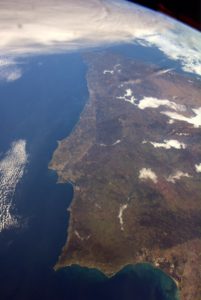‘From now on, every time we – black women – look at the steps of the Parliament, we will not see each other with buckets and mops to clean – we are inside and have a voice ’ (Romualda Fernandes, MP)

A hundred protesters marched on Saturday the 27th of June through downtown Lisbon shouting ‘Portugal is not racist’. The demonstration was organized by Andre Ventura, the leader of the Far Right-party Chega (Enough).

Last October, Ventura won the first far right’s seat in Parliament, where he will face strong opposition of three newly elected black deputies with a Guinean background, Joacine Katar, Beatriz Gomes Dias and Romualda Fernandes. Never before in history was the composition of the Assembly of the Republic that diverse.

The march was held three weeks after thousands gathered in the capital in protest against racism and police brutality and took place at a time when the authorities are worried about a new wave of coronavirus cases in the outskirts of Greater Lisbon, where new lockdown measures have been installed in 19 parishes of Sintra, Loures, Odivelas, Amadora and Santa Clara.
The European Social Survey (ESS) recently showed that nearly two-thirds of the Portuguese people have prejudices on racism; either biological (‘Are there ethnic or racial groups, by nature, more intelligent?’) or cultural (‘Are there cultures, by nature, more civilized than others?’). One in three Portuguese manifest racist opinions on both biological and cultural racism. Only 11% of the population disagrees with all racist beliefs.

The older the Portuguese are, the greater the number of people who manifest racism.
Although the majority of young people disagree that there are more intelligent ethnic or racial groups, 70% believes that certain cultures are more civilized than others.
Higher levels of education or income do not completely erase racism even though less racism is noted among these citizens.

The good news in the survey is that in recent years the position of the Portuguese against immigrants from different ethnic backgrounds has improved.
Five years ago Portugal belonged to the three EU countries that were most opposed to receiving immigrants from poor countries but it evolved towards greater openness and has become one where this objection dropped significantly.

‘However it remains to be seen how these immigrants are integrated’, underlines Alice Ramos, a sociologist at the Social Science Institute of the University of Lisbon. ‘You would have to know why people think that immigrants should enter, what jobs they should do and what they think about nationality and family reunification?
The results do not contradict the results of racist beliefs. It is one thing to give an opinion, the other is an attitude of discrimination against someone with a different ethnic background.’
Stay healthy Fique saudável (pic Público/Sapo)

 The ‘typical’ Portuguese doesn’t exist in a country that has been occupied by a great number of civilizations – Phoenicians, Romans, Visigoths, Celts, Swabians, and Arabs.
The ‘typical’ Portuguese doesn’t exist in a country that has been occupied by a great number of civilizations – Phoenicians, Romans, Visigoths, Celts, Swabians, and Arabs. The national territory can – according to the Ministry of Environment – roughly be divided into:
The national territory can – according to the Ministry of Environment – roughly be divided into: